Kate Roughley: Everything the judge told ‘callous’ nursery worker as she was jailed for killing baby Genevieve
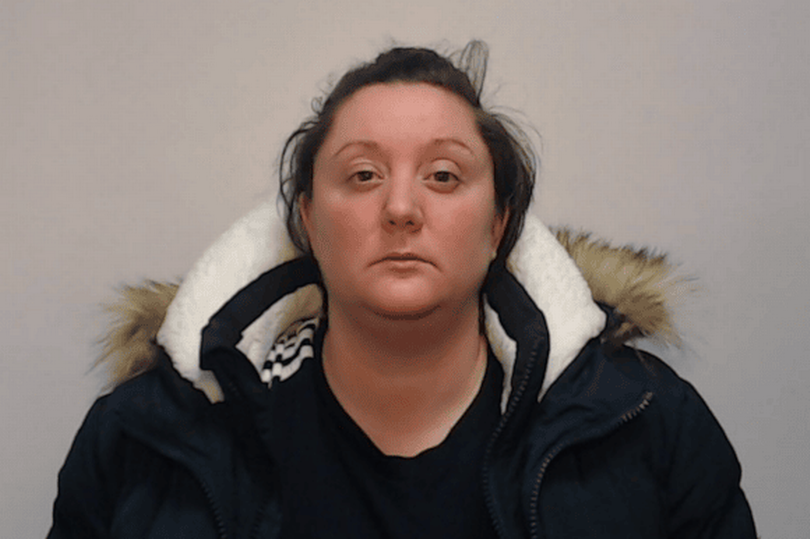
A judge told killer nursery worker Kate Roughley that her ‘callous acts’ deprived the future of a ‘sunny, funny, little girl’.
The 37-year-old was found guilty of manslaughter following a Manchester Crown Court trial.
She swaddled nine-month-old Genevieve Meehan in a blanket, before strapping her face down onto a bean bag while she was in her care at Tiny Toes Nursery in Stockport, in May 2022. The beloved little girl died from a combination of asphyxia and 'pathophysiological stress'.
READ MORE: Nursery worker Kate Roughley jailed for 14 years for killing nine-month-old Genevieve Meehan
Roughley, of Basil Street, Heaton Norris, had ‘taken against’ Genevieve, fondly called Gigi by her family. She was overheard on CCTV telling the crying child to 'stop your whinging', called her a 'stress head', and sang 'Genevieve, go home, Genevieve, go home'.
On the afternoon of May 9, 2022, Roughley tightly swaddled Genevieve in a blanket, wrapping her arms and legs inside, and put her face down on a bean bag before strapping her down with a harness. Genevieve was left virtually immobilised and face down from 1.35pm to 3.12pm, as Roughley ignored her distressed cries.
She eventually checked on her, finding her blue and unconscious and raised the alarm. Staff - then paramedics - attempted to revive Genevieve, but she was pronounced dead later that day at Stepping Hill hospital.
Roughley was jailed for 14 years.
This is what Kate Roughley was told by the judge, Mrs Justice Ellenbogen, as she sentenced her at Manchester Crown Court
“Kate Roughley, you may remain seated for now.
“You have been convicted by a jury of unlawful act manslaughter and I must now sentence you for that crime.
“Genevieve Zofia Meehan, affectionately known as Gigi, was born prematurely on 18 July 2021. She was adored by her parents and wider family. When she was eight months old, her parents enrolled her at Tiny Toes Nursery, your place of work; a place at which they had every right to expect that she would be looked after by trained and professional staff, who would care for her and keep her safe.
“That is a decision which responsible parents make every day. Genevieve attended nursery on five days in April and, following a viral infection, on three in May 2022, on the last of which — 9 May, she died whilst in your charge, aged 9 months and 21 days. Her death was absolutely avoidable, the result of your unlawful acts on that day.
“During the afternoon of 9 May, you put Genevieve down to sleep on a beanbag, I am satisfied — to the criminal standard — face-down, having first tightly swaddled her, so that her ability to move was severely restricted. You fastened her into a harness, further restricting her ability to move, and placed a blanket over her which at least partially covered her head.

“As the harrowing video and audio CCTV footage of that day shows, you left Genevieve in that position, carrying out only the most cursory and infrequent of checks, for over ninety minutes, during which time her increasing distress was readily apparent, both visibly and audibly. She can be seen desperately moving her lower body, and heard crying and coughing, in her ultimately futile struggle to breathe.
“In so doing, and inevitably given your acts, she sank further into the soft and damp surface of the beanbag, became exhausted and overheated, and re-breathed the increasingly Oxygen-depleted air around her face. I am certain that every person in this courtroom who watched the footage was willing you to pick her up, and remove her from the danger in which you had placed her, knowing, of course, that you would not.
“Genevieve’s final movement was at 14:24 that afternoon. At 15:12, you raised the alarm, having discovered that she had stopped breathing. Subsequent attempts to resuscitate her did not succeed and she was pronounced dead at Stepping Hill Hospital, at 16:09.
“The cause of death was later certified by Dr Lumb to have been the combination of asphyxia and pathophysiological stress imparted by an unsafe sleeping environment.
“As is common knowledge, even amongst lay people, safe sleeping practice requires that a baby of Genevieve’s age and developmental stage be placed to sleep on its back, on a firm, flat surface. That guidance is to be found on the NHS website and on the Lullaby Trust’s website to which it hyperlinks but which, on your evidence, you did not trouble to read.

“Tiny Toes’ own sleep policy at the relevant time stated that babies were to be placed on their backs to sleep and that, if a baby had rolled onto its tummy, it would be turned onto its back again, unless it was capable of rolling from back to front, and back again, on its own. You told the jury that you understood the importance of adhering to those aspects of the policy, which further provided that checks on a sleeping baby were to be recorded every 10 minutes. Both the NHS and the Lullaby Trust guidance state that a baby should be placed ‘feet to foot’ (that is, with its feet touching the foot of the cot), and that any blanket should be tucked in no higher than its shoulders, to ensure that its head is not covered.
“The Lullaby Trust guidance states that a swaddled baby should never be put to sleep on its front or side. As an NVQ Level 3-qualified nursery worker, you had been trained in safe sleep practices for babies.
“At the time of Genevieve’s death, you were 35 years old and had acquired 17 years of experience in caring for very young children, all but a few weeks of which whilst working at Tiny Toes nursery. By 9 May 2022, you had been working in the Baby Room for over two years, yet you failed to adhere to any of the key requirements of safe sleep practice, with the tragic consequences which I have described.
“In the course of your evidence, you asserted, variously, that the use of the beanbag as a bed had been common practice at the nursery, in part because the number of babies had exceeded the number of available cots; that you had placed Genevieve on her side, rather than her front; that your swaddling and harnessing of her had not been so tight as unduly to have restricted her ability to move; and that the blanket had been one through which air could pass and had not covered her head.
“You gave evidence to the effect that your title of Deputy Manager and your position as Head of the Baby Room had conferred no additional responsibility beyond the ability to administer medicine; that the ratio of staff to children had been inadequate; and that the senior management team had endorsed or condoned the practices which you had adopted.
“None of that could explain or justify your conduct on 9 May. There had been two cots available for Genevieve’s use that afternoon. Whether or not the use of a beanbag as a bed had been commonplace at the nursery, placing a baby on such an item, and other than on its back, was inherently dangerous, and obviously so, irrespective of whether Genevieve had been experiencing some post-viral symptoms.

“That danger could only have been compounded by swaddling and harnessing her in such circumstances. You then failed adequately to check on Genevieve over a protracted period; a failure which was inexcusable generally and certainly in the circumstances in which you had put her down to sleep and in the context of her obvious distress.
“By its verdict, the jury has rejected your evidence that you were able to, or did, conduct suitable visual checks from the end of the room. I am sure that it was right to have done so.
“Had you conducted such checks, the number and nature of which you have exaggerated since your first contact with the police, Genevieve’s distress would have been abundantly apparent, but, in any event, mere visual checks from a distance, on a baby of that age, in particular in the circumstances in which you had left her, were woefully inadequate, as was clear from the evidence of Dr Garstang, Consultant Community Paediatrician, and a specialist in child death and safeguarding.
“From the CCTV footage of 5, 6 and 9 May, it is apparent that, at best, you considered Genevieve to have been a nuisance and, at times, displayed considerable exasperation and antipathy towards her.
“By its verdict, the jury has found that the base offence underpinning your offence of unlawful act manslaughter was child cruelty — that you wilfully ill-treated Genevieve, in a manner likely to cause her unnecessary suffering or injury to health.
“That is consistent with the behaviour which you displayed towards her on 6 May, in the footage of which you can be heard chanting, ‘Stop your whingeing, Genevieve’, and ‘Genevieve, go home’; telling her to ‘change the record’; referring to her as ‘Stress Head’; and saying, ‘Genevieve, If we had any chance of being friends, you just blew it’.

“On the morning of 9 May, in obvious exasperation, you berated her for having slept for only twenty minutes, having called her ‘vile’. I am quite satisfied that you used that word to describe Genevieve herself, and not, as you claimed in evidence, her cough.
“On that morning you again chanted ‘Genevieve, go home’, continuing, ‘Guess who’s having Genevieve tomorrow? Becca, Becca...’, your colleague.
“At 13:28 that afternoon, you told another colleague, ‘Rather just put her on the beanbag, then I’m not wasting a cot.’ Genevieve was then placed on the beanbag at around 13:35. You are seen to have checked her at 14:09, but, notwithstanding her kicking, wriggling, the arching of her back and her tears, left her there.
“At 14:10, Genevieve coughed for several seconds. You bent over her and placed a blanket over her head. Over the next few minutes, she continued to cry, to cough and to raise her legs, bottom and head. Her crying intensified and acquired a grunting tone, her distressed body movements continued.
“Yet, even then, you did not approach her, pick her up, or show any concern for her welfare. You left her to die. The first point at which you approached her following her final movement was 22 minutes later, when you bent over, but did not touch her, for one second, telling a colleague, ‘I couldn’t see her chest going up and down.’
“At 14:53, you undertook a visual check, informing your colleague that you did not want to move Genevieve, as that had been why she had woken up on the previous occasion, adding, ‘You don’t go near a sleeping baby, do you?’
“Your interactions with Genevieve, on 6 and on 9 May, palpably lacked any care, kindness or concern for her wellbeing. Dr Garstang’s characterisation of your approach as having constituted rough handling and demonstrated a lack of caring or awareness of a little baby’s needs, is apt.
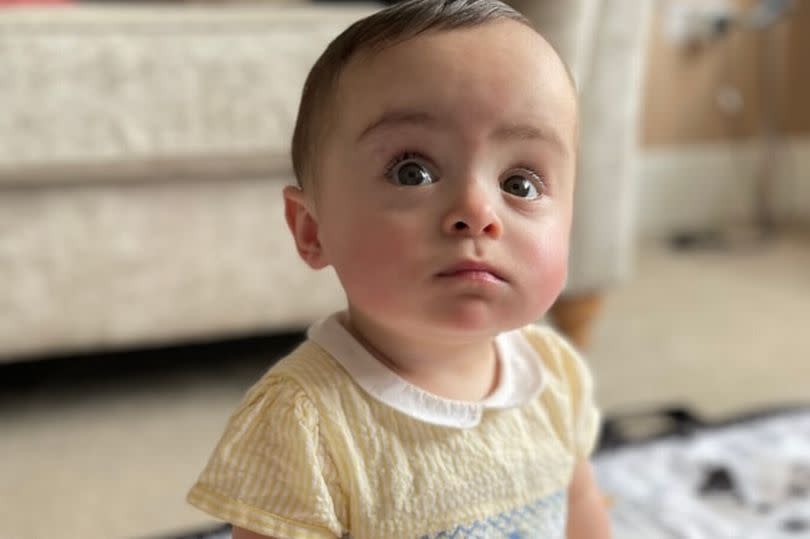
“I acknowledge that the ratio of staff to children in the Baby Room, on 9 May and on other days, apparently fell well short of applicable Early Years Foundation Stage statutory framework requirements, but that does not explain and cannot justify your own conduct on 9 May.
“It did not bring about the circumstances in which you placed Genevieve to sleep; it did not preclude you from checking on her in an appropriate manner, or with suitable frequency; and it did not compel you to leave her in mortal danger.”
Speaking about the victim impact upon Genevieve’s family, the judge said: “At your hands, Genevieve’s parents and grandparents, who have attended throughout this trial and conducted themselves with such dignity, have lost their sunny, funny little girl. The last photograph which Genevieve’s mother took of her, the weekend before she died, is of a bright, happy and healthy baby, full of personality, grinning at the camera in her new swimming costume.
“By your callous acts, you have deprived her of the future which she should have had and left an enduring void in her family’s lives.
“In her first personal statement, Genevieve’s mother describes how desperate she had been to have Genevieve and the joy which she had experienced when Genevieve was born. She says that her love for Genevieve cannot be put into words and that nothing can reflect the horror of her death, or the life which she now lives, in which she feels Genevieve’s absence every moment.
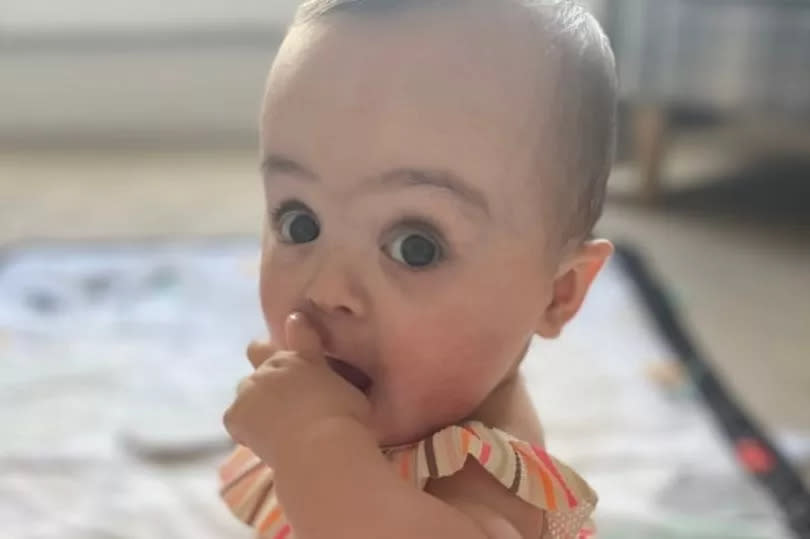
“Following her premature birth, through the care of clinicians and her parents, Genevieve had thrived. Her mother describes how Genevieve and her six-year-old sister had become inseparable and how Genevieve would laugh and bounce with excitement when her sister came into the room.
“She speaks of her heartache when she looks at Genevieve’s things and thinks of all the love, opportunities and life which she will never experience. She describes her as a beautiful soul, the image of her daddy and the light of their lives.
“She also notes that her older daughter wants her to say this on her behalf, ‘Every day I get punched with sadness. What this lady has done is terrible and nobody should experience this. My younger sister should have the experience of having two older sisters and I should have both of my sisters. This has changed my life forever.’
“In her second statement, Genevieve’s mother observes that, in the course of your trial, she and her partner have heard and seen things which no parent should ever have to witness and have realised that Genevieve had suffered and been frightened whilst fighting for her life, something which they had not previously appreciated.
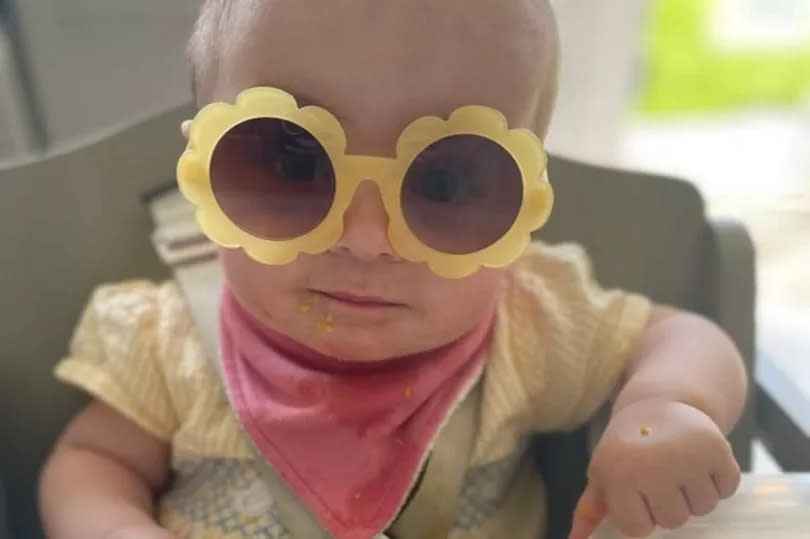
“In his equally poignant personal statement, Genevieve’s father describes her as having been fun, passionate, mischievous, independent, and full of life. He notes the many things which every parent longs to experience as a child grows up, but which he and her mother never will.
“He explains the pain and horror which you have caused and states that your actions have shattered his heart and soul. Like Genevieve’s mother, he says that he will never forgive himself for having left Genevieve in your care.
“Genevieve’s parents have nothing for which to forgive themselves — they left Genevieve in the care of qualified nursery staff, for which no criticism can possibly attach. No part of the events which followed is their fault, as I hope that they will come to accept.
“Your own parents, who have attended and supported you throughout this trial, are amongst those whose lives you have marred by your actions. They, too, must now endure the consequences of their daughter’s actions and the pain which they have been caused."
Addressing sentencing guidelines, she accepted it would appear ‘detached and legalistic’ to Genevieve’s family and the general public, but it was an exercise that had to be undertaken, and in no way ‘minimised’ the human impact of Roughley’s offending.
“Under the sentencing guideline for unlawful act manslaughter, I assess your culpability as high — category B; Genevieve’s death was caused in the course of an unlawful act which carried a high risk of death or grievous bodily harm, which was, or ought to have been, obvious to you, as counsel agree.

“In all cases of manslaughter, the harm caused is, inevitably, of the utmost gravity. Thus, the starting point for your offence is 12 years’ imprisonment, with a category range of 8 to 16 years.
“Aggravating your offence, as Ms Elliott KC acknowledges on your behalf, were Genevieve’s particular vulnerability, by reason of her age; the mental and physical suffering which you caused her — in Dr Garstang’s words, ‘I think that she was very distressed because she was uncomfortable, that she would have recognised she couldn’t breathe. She would have been becoming scared; this was genuine fear’ — and your abuse of a position of trust.
“I do not consider the fact that your offence was committed in the presence of other children to have been a further aggravating factor — each was a child then between six and a half and thirteen and a half months old and, mercifully, there is no evidence that any of them had been able to comprehend what had happened.
“I bear in mind your personal mitigation, being your lack of previous convictions and of premeditation. Furthermore, albeit that there is evidence suggestive of, at its lowest, your unprofessional handling of other children in your care, you have been charged with no other offence and I treat you as being of positive character.
“I have had regard to the character references which have been provided. Some, little, mitigation is afforded by the fact that you went to seek the assistance of a senior manager when you discovered that Genevieve was not breathing, albeit that you took no steps to assist her directly, yourself.
“You have steadfastly refused to acknowledge that any act of yours caused Genevieve’s death. Your evidence that your thoughts are always with Genevieve’s family and everything which they have been through rang hollow and I do not consider it to have demonstrated genuine remorse, or, hence, to afford a further mitigating factor (though I make clear that I do not treat it as an aggravating factor).
“Relying upon R v Ali [2023] EWCA Crim 232, Ms Elliott urges me to take account of the current height of the prison population, as an exceptional factor having consequences for the conditions in which prisoners are held.
“As Edis LJ made clear in that case [22], that is a consideration principally applicable to shorter sentences, because a significant proportion of such sentences is likely to be served during the time when the prison population is very high.
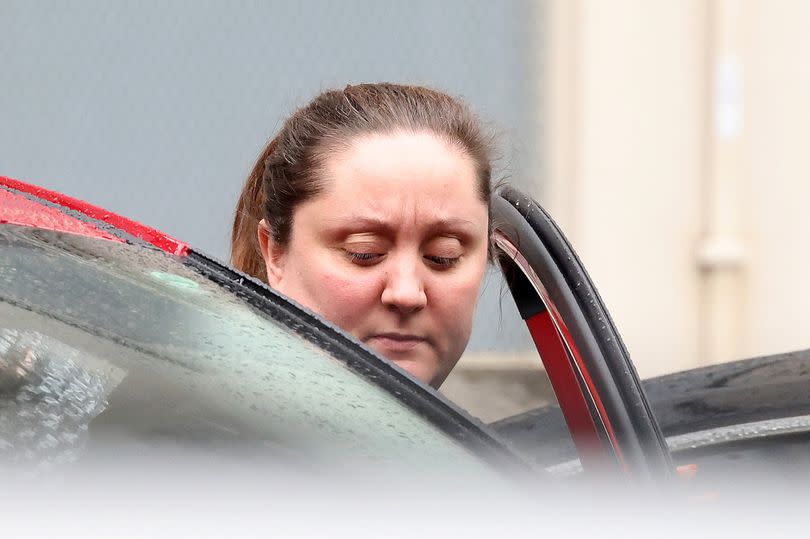
"Furthermore, as the Court of Appeal observed in R v Whittington [2020] EWCA Crim 1560 [30], when addressing the effect of the pandemic upon prison conditions, the more serious the offence and the longer the sentence, the less the exceptional factor in question can weigh in the balance in favour of a reduction, unless there is clear, cogent and persuasive evidence of a disproportionately harsh impact upon the prisoner.
“Acknowledging, as I do, the general observation made by the Court of Appeal in R v Foster [2023] EWCA Crim 1196 [42], Ms Elliott has produced no evidence of the extent of overcrowding in the female prison estate, or of its prospective impact upon you. For all such reasons, I do not consider it appropriate to reduce the length of your sentence on the basis which she advances.”
Addressing the issue of dangerousness under sentencing provisions, she said the following:
“I turn to the next step in the sentencing guideline, which requires me to consider the issue of dangerousness; a term which has a particular legal meaning in this context. In so doing, I have regard to the approach set out in R v Burinskas [2014] EWCA Crim 334, a case concerned with predecessor statutory provisions.
“That step obliges me to consider whether, having regard to the criteria contained in Chapter 6 of Part 10 of the Sentencing Code, it would be appropriate to impose a life sentence under (in this case) section 285 of the Sentencing Act 2020 (to which I shall refer as 'the 2020 Act') and, if not, whether to impose an extended sentence, under section 279 of the 2020 Act.
“Under section 285, where the qualifying conditions for which sub-section 285(1) provides are satisfied, the court must impose a sentence of imprisonment for life, if it considers that the seriousness of your offence justifies the imposition of such a sentence.
“Addressing the qualifying conditions, you were over the age of 21 at the time of your conviction; manslaughter is an offence identified at paragraph 1 of Schedule 19 to the 2020 Act; and your offence was committed after 4 April 2005.
“However, I am of the opinion that you do not pose a significant risk to members of the public (including young children) of serious harm occasioned by your commission of further violent offences, as specified in Part 1 of Schedule 18 to the 2020 Act and the Crown does not seek to persuade me to the contrary.
“In accordance with section 308 of the 2020 Act, in so concluding I have taken into account, as I must, all information which is available to me about the nature and circumstances of your offence and, as I may, any information about you which is before me, in particular, your age, lack of previous convictions and positive character.

“For the purposes of sub-section 285(2) and section 30 of the 2020 Act, in the circumstances of this case, and having regard to those same factors, I consider it to be unnecessary to obtain a pre-sentence report in forming that opinion. Neither counsel suggests that any such report is required. In those circumstances, the qualifying conditions are not satisfied and section 285 does not apply, from which it follows that I am not obliged to impose a sentence of imprisonment for life.
“I, therefore, turn to consider whether an extended sentence is appropriate, in accordance with section 279 of the 2020 Act. Having regard to the qualifying conditions set out in section 280(1), and for the reasons previously stated, I am of the opinion that there is no significant risk to members of the public (including young children) of serious harm occasioned by your commission of further specified offences, and that it is unnecessary to obtain a pre-sentence report in forming that opinion.
“Furthermore, the so-called ‘earlier offence’ condition, for which section 280(1)(e) provides, is not satisfied. It follows that no extended sentence of imprisonment is available.”
Roughley was then asked to stand by the judge.
“Having regard to the starting point and category range for which the applicable sentencing guideline provides, and to the aggravating and mitigating factors to which I have referred, I sentence you to 14 years’ imprisonment, being the shortest term which I consider to be commensurate with the seriousness of your offence.
“You will serve two thirds of that period, being 9 years and 4 months, in custody. After that time, you will be released on licence. Your release will not bring your sentence to an end.
“If, after your release and before the end of the period covered by your sentence, you commit any further offence, or breach any condition of your licence, you may be ordered to return to custody to serve the balance of the original sentence outstanding at that time, as well as being sentenced for any further offence.”

 Yahoo News
Yahoo News 
